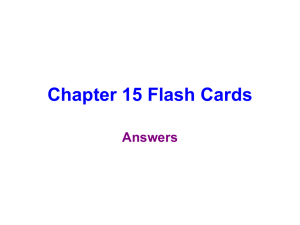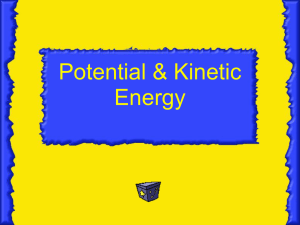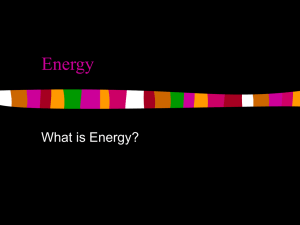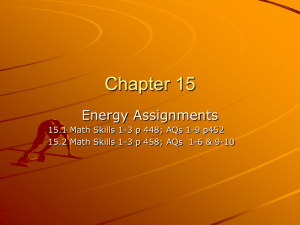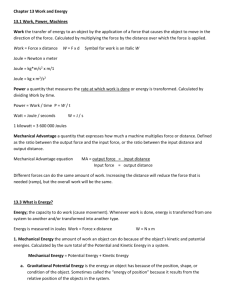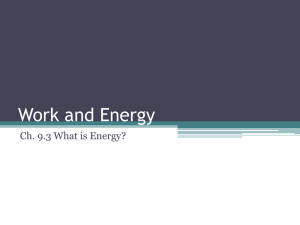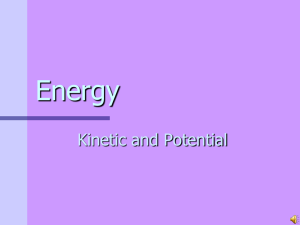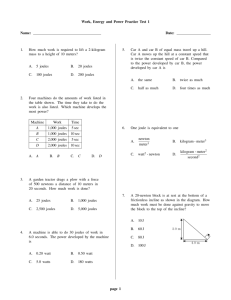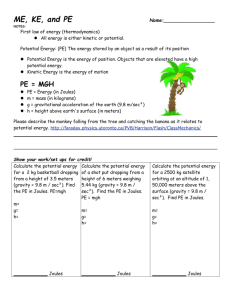Lesson 1 Types of energy
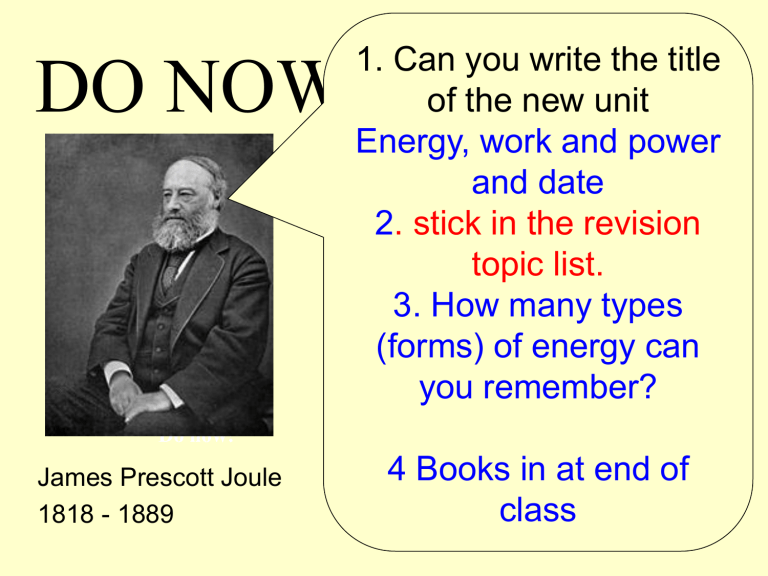
DO NOW!
1. Can you write the title of the new unit
Energy, work and power and date
2 . stick in the revision topic list.
3. How many types
(forms) of energy can you remember?
Do now!
James Prescott Joule
1818 - 1889
4 Books in at end of class
Learning today
• Work done
• W.D =
Forces x distance in the direction of the force
.
• The Joule J the unit for both energy and work done
• What is energy
• Types of energy
Work done - copy please
When any object is moved around work will need to be done on it to get it to move (obviously).
We can work out the amount of work done in moving an object using the formula:
Work done = Force x distance moved in direction of the force
W in J in N in m joules newtons meters
F d
Question 1
Calculate the work done when a force of
5 newtons moves through a distance of
3 metres.
work = force x distance
= 5N x 3m work = 15 joules
Question 2
Calculate the work done when a force of
6 newtons moves through a distance of
40 centimetres.
work = force x distance
= 6 N x 40 cm
= 6 N x 0.40 m work = 2.4 joules
Now do
• Make Force the subject of the equation
F
W d
• Make distance the subject of the equation
Question 3
Calculate the value of the force required to do 600 joules of work over a distance of 50 metres.
work = force x distance becomes: force = work done ÷ distance
= 600 J ÷ 50 m force = 12 newtons
Question 4
Calculate the distance moved by a force of
8 newtons when it does 72 joules of work.
work = force x distance becomes: distance = work done ÷ force
= 72 J ÷ 8 N distance moved = 9 metres
Example questions
1. Bori pushes a book 5m along the table with a force of 5N.
He gets tired and decides to call it a day. How much work did he do?
2. Alicia lifts a laptop 2m into the air with a force of 10N.
How much work does she do?
3. Martin does 200J of work by pushing a wheelbarrow with a force of 50N. How far did he push it?
4. Chris cuddles his cat and lifts it 1.5m in the air. If he did
75J of work how much force did he use?
5. Carl drives his car 1000m. If the engine was producing a driving force of 2000N how much work did the car do?
Question 5
Calculate the work done by a child of weight 300N who climbs up a set of stairs consisting of 12 steps each of height 20cm.
work = force x distance
The child must exert an upward force equal to its own weight.
Therefore: force = 300N
This force is exerted upwards and so the distance must also be measured upwards.
= (12 x 20cm)
= 2.4m
therefore: work = 300 N x 2.4 m work = 720 J
What is Energy?
What is Energy?
“The capacity to do work”
Not a very good definition!
Energy measurement – Copy please
Energy is measured in joules (J)
To lift an apple 0.1 kg upwards by one metre requires about one joule of energy.
1 kilojoule (kJ) = 1 000 J
10 3 J
1 megajoule (MJ) = 1 000 000 J
10 6 J
Types of energy
Energy can take many forms;
Now list the different types of energies in the following two groups
Kinetic Energy – movement energy
Potential Energy – energy due to position or shape or stored energy
Forms of energy
Energy can exist in many forms.
1. THERMAL or HEAT ENERGY
This is the energy of an object due to its temperature.
2. LIGHT ENERGY
This is energy in the form of visible electromagnetic radiation.
Light
5. KINETIC ENERGY
This is the energy possessed by a moving object.
Kinetic energy increases is the object’s speed is increased.
Also often called ‘Movement energy’
A kicked football has 50J of energy
Kinetic (movement)
3. ELECTRICAL ENERGY
This is the energy transferred by an electric current.
4. SOUND ENERGY
This is energy in the form of a sound wave.
Chemical
Nuclear
6. CHEMICAL ENERGY
This is energy that is released when chemical reactions take place.
Sources of chemical energy include: fuel, food and batteries.
Energy in one chocolate biscuit 300 000 J
Energy in the food you in one day 11 000 000 J
7. NUCLEAR ENERGY
This is energy that is released when nuclear reactions take place.
This is the source of the
Sun’s energy.
Gravitational potential
8. POTENTIAL ENERGY
This is the energy possessed an object due to its position.
Gravitational Potential Energy
The gravitational potential energy of an object increases if it is raised upwards.
Elastic Potential Energy
This is the energy stored in a stretched or squashed object
- also known as strain energy
Gravitational potential energy being converted into kinetic energy.
• A fully flexed bow stores around 300J of energy
Strain
Now list the different types of energies in the following two groups
Kinetic Energy – movement energy
Potential Energy – energy due to position or shape or stored energy
• Thermal
• Light
• Sound
• Electric
• Kinetic
• Chemical
• Gravitational
• Strain
• Nuclear
The Law of Conservation of
Energy
Energy can be changed
(transformed) from one type to another, but it can never be made or destroyed.
This means that the total amount of energy in the
Universe stays the same!
\
Energy Flow diagrams
We can write energy flow diagrams to show the energy changes that occur in a given situation.
For example, when a car brakes, its kinetic energy is transformed into heat energy I the brakes.
Kinetic heat
Other examples
When a rocket launches.
Other examples
When a rocket launches.
Chemical kinetic + sound + heat gravitational
Energy Circus
Around the room are a few examples of energy changes (some simple, some a little more complicated!)
For each example I want you to write the name of the experiment and then the energy flow diagram for that experiment
You will have 2 minutes on each example.
Ready
?
